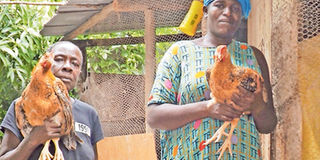Woman and daughter-in-law creating wealth, one chicken at a time

Kache Mitingi and her daughter-in-law, Mary Achieng in their poultry farm in Kilifi. So far, their agribusiness has generated over Sh100,000 and they are working to grow it. PHOTO | BOZO JENJE | NATION MEDIA GROUP
What you need to know:
- Her children helped her set up the project on part of her three acres with Sh20,000 capital, which was spent on the poultry house, chicks and feeds.
- Mitingi runs the business with her daughter-in-law, Mary Achieng, who explains that they keep a stock of hens, from where they get eggs for hatching.
- During the first three days, the birds are not able to identify the feeders. For easy feeding, they spread clean newspaper sheets on the floor on which they spread the chick mash feed.
- Talal Abeid, a financial analyst in Mombasa, notes that irrespective of the size of a business, one needs a sound financial plan to succeed.
Fallow land stretches as far as the eyes can see as we traverse Kilifi County on our way to Msabahi, where farmer Kache Mitingi keeps poultry.
Soon we arrive and the jovial Mitingi ushers the Seeds of Gold team into her poultry farm, which she started in 2017.
“I started the project because of two reasons, one is that I picked lessons from a neighbour who was keeping poultry and needed to use them. Second is that I love chicken meat and it was hard to come by these sides,” offers the 60-year-old.
Her children helped her set up the project on part of her three acres with Sh20,000 capital, which was spent on the poultry house, chicks and feeds.
“I bought 100 day-old Kenbrow chicks and at six months, they started laying, with a tray going for Sh300. That Christmas, I sold 40 birds at Sh800 each,” she says.
Mitingi runs the business with her daughter-in-law, Mary Achieng, who explains that they keep a stock of hens, from where they get eggs for hatching.
SOUND FINANCIAL PLAN
Once they get the chicks, they keep them in an oval-shaped brooder made of cardboard that is fitted with electric bulbs that provide heat.
During the first three days, the birds are not able to identify the feeders. For easy feeding, they spread clean newspaper sheets on the floor on which they spread the chick mash feed.
“We vaccinate the birds against Newcastle at day six, then 14 days later we give them Gumboro vaccine. On the 28th day, Newcastle vaccine is added in water and at six weeks fowl pox vaccine is administered through the wings,” explains Achieng, 36, who is a nursery schoolteacher in Kilifi County.
So far, the business has generated over Sh100,000 and they are working to grow it, says Achieng, who took a Sh40,000 loan from their table-banking group to expand the trade.
“We added 100 more chicks in readiness for the December boom,” she adds.
Talal Abeid, a financial analyst in Mombasa, notes that irrespective of the size of a business, one needs a sound financial plan to succeed.
“You have to balance between passion and business, grow step by step as you learn from your mistakes,” he says.





